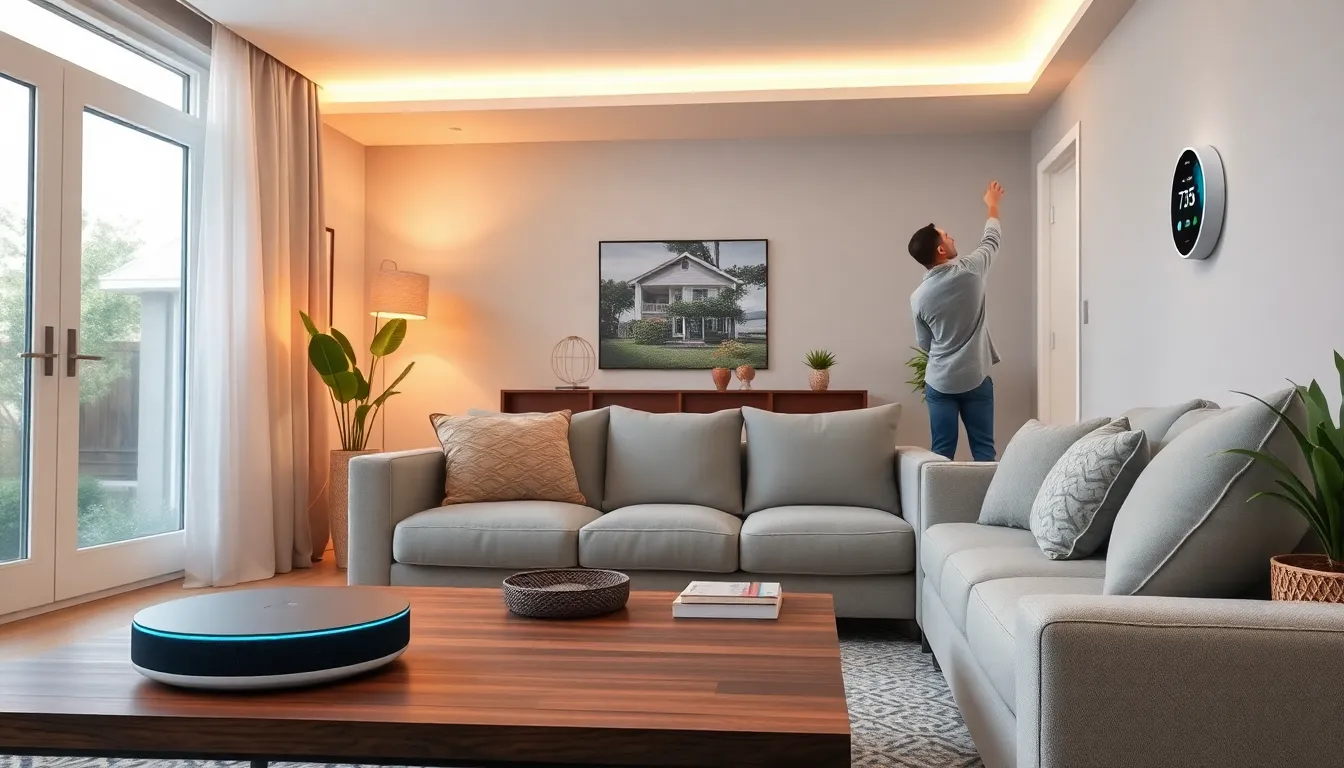Imagine walking into your home and having it greet you like an old friend. Lights dim to your favorite setting, the thermostat adjusts to the perfect temperature, and your coffee machine starts brewing just in time for your arrival. Sounds like a scene from a sci-fi movie, right? Well, welcome to the world of smart homes, where technology doesn’t just live in your pocket but transforms your living space into a high-tech haven.
Smart home installation services are here to make this dream a reality. They’ll help you navigate the maze of gadgets and gizmos, ensuring your home is not just smart but also comfortable and secure. Whether it’s voice-activated assistants or smart security systems, professionals can tailor solutions to fit your lifestyle. So why settle for ordinary when you can have a home that practically rolls out the welcome mat?
Table of Contents
ToggleOverview Of Smart Home Installation Services
Smart home installation services provide comprehensive solutions for homeowners seeking to automate their living spaces. These services encompass the setup of interconnected devices that enhance functionality and security in homes. Professional installers guide clients through choosing and configuring the right devices tailored to their specific needs.
Integration of smart systems such as lighting, heating, and security offers seamless control through smartphones and voice commands. Installers often demonstrate how to use these technologies effectively, ensuring homeowners feel comfortable with their new systems. Furthermore, consistent support and maintenance services help address any issues that may arise post-installation.
Services also include assessments to identify the best products for each home setup. This custom approach allows for maximum efficiency and user satisfaction. Smart home specialists remain up-to-date with the latest technology trends, providing insights on innovative products and solutions.
Home automation can lower energy costs by optimizing usage patterns. By employing smart thermostats and energy-efficient lighting, homeowners can achieve significant savings. Beyond energy efficiency, improved security features, such as smart locks and cameras, provide peace of mind.
Overall, smart home installation services equip homeowners with the tools to create a connected living experience. The integration of various technologies enables improved convenience, enhanced security, and an increased sense of well-being, elevating everyday living standards. Engaging with experienced professionals simplifies the transition to a smart home, making it an accessible investment for modern households.
Benefits Of Smart Home Technology

Smart home technology streamlines daily tasks and enhances lifestyle. Integrating automated systems increases comfort and efficiency in a modern living space.
Increased Convenience
Smart home devices simplify daily routines, allowing for effortless control of lights, temperature, and appliances. Homeowners manage their environments through smartphones or voice commands. As a result, adjusting settings remotely becomes possible, whether at home or away. For instance, pre-programming coffee makers ensures fresh coffee upon waking. Additionally, timers for lighting enhance security and conserve energy by simulating occupancy. The convenience of these features allows users to enjoy more free time without unnecessary hassles.
Enhanced Security
Home security systems integrated with smart technology offer improved protection. Remote monitoring through cameras and alarms alerts homeowners about unusual activity. When integrated with smartphone apps, these systems enable real-time alerts and instant access to video feeds. Moreover, smart locks provide secure keyless entry, allowing for temporary access to guests or service providers. Enhanced security features boost peace of mind, knowing one’s home is safe from potential threats. This comprehensive approach to safety significantly reduces theft and break-ins.
Energy Efficiency
Smart home technology promotes energy efficiency and reduces overall utility costs. Automated systems optimize energy usage in real-time by adjusting heating and cooling based on occupancy. Programmable thermostats, for example, learn user preferences and adjust temperatures accordingly. Furthermore, smart lighting systems deactivate when rooms are unoccupied, conserving electricity. Data from energy monitoring devices helps homeowners identify patterns and make informed choices. This efficiency translates to lower energy bills and a greener, more sustainable living environment.
Types Of Smart Home Systems
Smart home systems encompass a variety of technologies designed to enhance convenience and security within residences. Below are key types of systems available for homeowners.
Home Automation
Home automation integrates multiple devices to streamline daily tasks. Devices like smart lights, plugs, and appliances connect through a central hub or app. This connectivity allows residents to control functions remotely, schedule operations, and create automated routines. For example, one can program lights to turn on at sunset or adjust the thermostat based on occupancy. Compatibility across devices from different manufacturers ensures flexibility and customization in home setups.
Security Systems
Smart security systems offer enhanced protection and peace of mind. Cameras, motion detectors, and doorbell systems connect to a homeowner’s smartphone for real-time monitoring. Alerts notify users of any unusual activity, enabling quick responses even when away from home. Many systems allow for remote access, offering the ability to view camera feeds or lock doors from anywhere. Integration with smart lighting can create the illusion of occupancy, deterring potential intruders.
Climate Control
Climate control systems optimize heating and cooling for energy efficiency and comfort. Smart thermostats learn user preferences over time, adjusting settings according to schedules and habits. They provide insights into energy usage, helping to reduce costs. Residents can manage indoor climates from smartphones, ensuring optimal comfort before arrival home. Integration with other smart devices enhances overall home efficiency, creating a cohesive environment tailored to individual needs.
Choosing The Right Installation Service
Choosing the right installation service significantly impacts the smart home experience. Several factors contribute to making an informed choice.
Factors To Consider
Experience of the service provider matters. Consider those with a proven track record in smart home technology. Range of services offered also plays a role; seek companies that provide comprehensive solutions that include device selection and installation. Customer reviews hold value; check for positive feedback from satisfied clients. Price transparency can enhance trust; ensure quotes reflect all costs associated with installation. Lastly, ask about warranty and support options; ongoing assistance after installation is critical for long-term satisfaction.
Questions To Ask
Which devices and systems does the installer specialize in? Inquire about their expertise to verify compatibility with specific products. What is the estimated timeline for installation? Understanding the schedule helps manage expectations. Do they provide training for new systems? Training can boost user confidence and ensure comfortable usage. How is ongoing support handled? Continuous support is crucial for troubleshooting any issues that may arise. What are the warranty terms on installed systems? Knowing coverage details can influence the decision.
Investing in smart home installation services opens the door to a world of convenience and security. By integrating advanced technology into everyday living spaces, homeowners can enjoy a more efficient and connected lifestyle. The right installation service ensures that each system is tailored to individual needs, maximizing both functionality and satisfaction.
With professional guidance, users can seamlessly control their environment, enhance security measures, and reduce energy costs. Embracing smart home technology isn’t just about modernizing a home; it’s about creating a personalized sanctuary that simplifies life. As homeowners explore these options, the benefits of a smart home become increasingly clear, paving the way for a smarter and more sustainable future.






